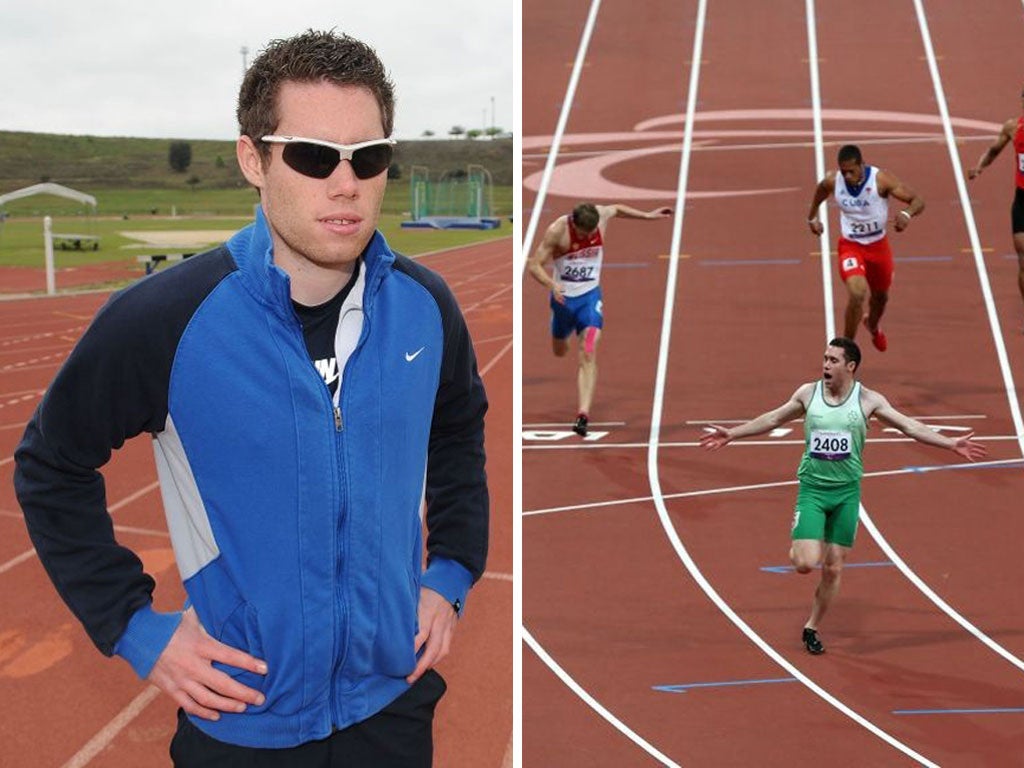
Your support helps us to tell the story
From reproductive rights to climate change to Big Tech, The Independent is on the ground when the story is developing. Whether it's investigating the financials of Elon Musk's pro-Trump PAC or producing our latest documentary, 'The A Word', which shines a light on the American women fighting for reproductive rights, we know how important it is to parse out the facts from the messaging.
At such a critical moment in US history, we need reporters on the ground. Your donation allows us to keep sending journalists to speak to both sides of the story.
The Independent is trusted by Americans across the entire political spectrum. And unlike many other quality news outlets, we choose not to lock Americans out of our reporting and analysis with paywalls. We believe quality journalism should be available to everyone, paid for by those who can afford it.
Your support makes all the difference.It was on the first morning in the Aquatics Centre, scene of so much notable achievement only a couple of weeks earlier from Michael Phelps, Missy Franklin et al, that Zheng Tao walloped his head against the end of the pool to stop the clock in his heat. That night Zheng did the same again, swimming smack bang into the wall and stopping the clock inside world-record time. Zheng has no arms.
See the ability not the disability, Oscar Pistorius had instructed on the eve of the Games. There were times over the past 11 days of competition in pool, stadium, velodrome and beyond when it was impossible not to see both and nowhere more so than in the pool where the swimmers were stripped bare, their impairments plain to see.
Xu Qing, another Chinese swimmer without arms, won four gold medals. Then there was Bradley Snyder, winning a gold medal exactly a year to the day after being blinded by a Taliban bomb.
Of course it goes beyond the pool. I watched a cyclist with one leg ride 64 kilometres up, down and around the undulating Kent countryside. This was elite sport even if all the competitors were not of the elite – as in the Olympics. It's about inclusivity and ability – as in the Olympics.
There was space to marvel both at sporting achievement and alongside it human achievement, once again exactly as in the Olympics.
David Weir spoke of the "superhumans" receiving deserved recognition after collecting his fourth gold medalyesterday afternoon.
Weir finished what Sarah Storey had started on the afternoon of the opening day of the Games. Two greats of British Paralympic sport bookended Britain's Games. Storey, like Weir, collected four gold medals and, in so doing, equalled Tanni Grey-Thompson's and Dave Roberts' total of 11. Add Ellie Simmonds and Jamie Peacock and Britain has four new – to a broader audience – sporting superstars.
"London will change the face of Paralympic sport forever," said Storey yesterday. "We've seen elite sport. We have not seen any patronising comments. When I first got into the Paralympic team 20 years ago I was told, 'Don't let them call you brave and courageous.' We haven't been and I am so proud."
In a sporting sense, the most notable change to emerge from the Games has been the improvement among a cluster of nations; Russia, Ukraine, USA and Australia, who have caught up with Britain. China remain ahead of the rest. Competition at the elite end is fiercer than ever and that is for the good of the Paralympics.
It offers a challenge to Britain, who lost the second place they held in both Beijing and Athens. That was one of ParalympicsGB's pre-Games targets. They surpassed their medal target – charged with winning 103 they collected 120 – but 34 gold, one fewer than in Athens and seven beneath Beijing's collection, saw them finish third.
Swimming missed its target, by one medal, but athletics more than made amends for a disappointing Beijing. Cycling, the other major British sport, delivered on its medal target, but with fewer golds than 2008.
If Britain did not get the gold medal boost hoped for from home advantage, they may yet reap the reward of London in four years' time.
Fifty-four of Britain's medallists in London were 22 or under and the broad attention – unparalleled in Paralympic history – their feats, and those of their elders, received should attract more new recruits.
Talent schemes have played an important part in Britain's Paralympic success. More are planned on the back of London and are likely to be significantly better attended. Awareness is all.
"Our ambition remains the same, we're on a journey and we don't want to see this as a high-water mark," said Tim Hollingsworth, chief executive of the British Paralympic Association.
"We have got a lot of momentum to keep going."
Join our commenting forum
Join thought-provoking conversations, follow other Independent readers and see their replies
Comments